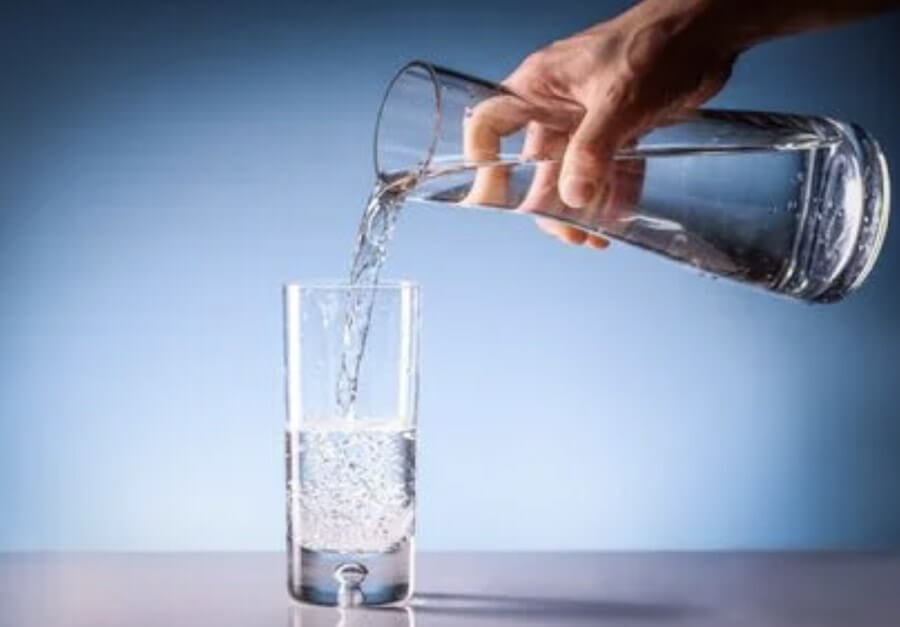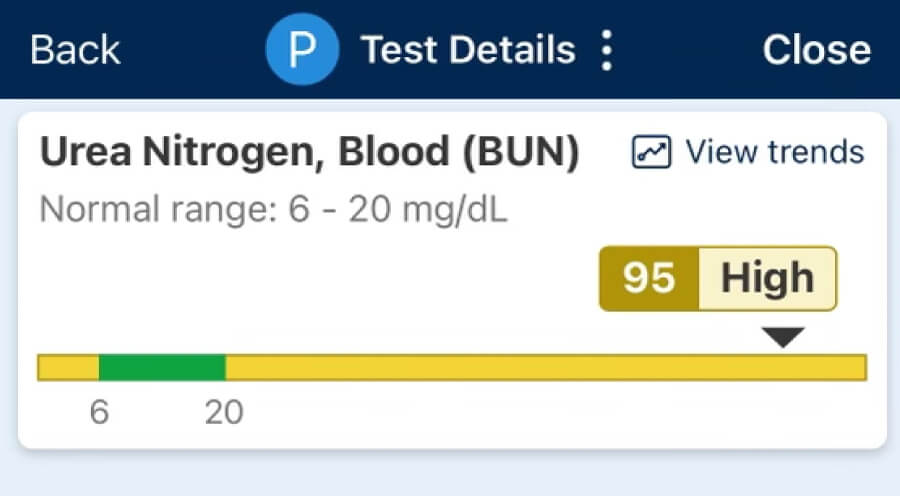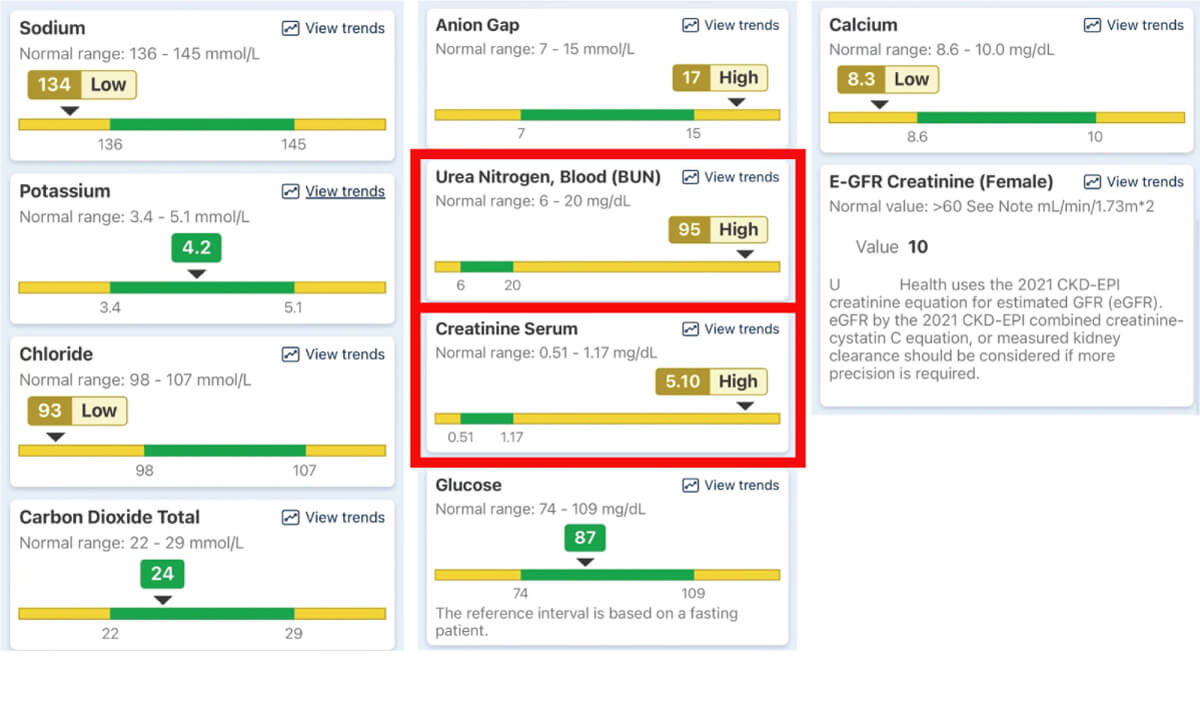The Bun Creatinine Ratio. The Biomarkers of Hydration and Renal Function.

Creatinine Bun Ratio Article Table of Contents
What is the BUN Creatinine ratio used for?
The BUN: Creatinine ratio is a measurement of either renal failure or a cause of dehydration in the body. Without this objective criteria dehydration is a clinical diagnosis, formed from the signs and symptoms of dehydration on the body.
When this is a symptom of renal failure, intervention from a nephrologist is required and in very severe cases, dialysis treatments. Renal failure can not be reversed and does not go into remission. The best one can do is get a kidney transplant or stop the progression of renal failure through exercise, a good renal diet meal plan, and pre-dialysis or dialysis treatments under the direction of your nephrologist.
What is the BUN creatinine ratio?
Creatinine is a molecular protein produced by the muscle and is relatively freely filtered by the kidneys. Hence, it is commonly used as a kidney function test as most adults make the same amount of creatinine every day. There are relatively few things that can affect the creatinine level hence the majority of fluctuations can be attributed to a change in kidney function.
BUN is the measurement of urea in the blood performed via a blood urea nitrogen test. Urea is a chemical waste product produced when your body breaks down protein used by your cells. During this process, your liver produces ammonia — which contains nitrogen — and combines with other elements, such as carbon, hydrogen and oxygen, to form urea. The urea travels from your liver to your kidneys through your bloodstream.

BUN test result shown are for a middle-aged woman on dialysis.
BUN and creatinine together are used to estimate the kidney function. But since kidney function is determined to some extent by a person’s fluid intake, a dehydrated body can lead to a high BUN: creatinine ratio. This is also called pre-renal azotemia.
A BUN/Creatinine ratio greater than 20 is considered high.
What causes a high BUN creatinine ratio?
1. Dehydration is one of the factors that causes a high BUN creatinine ratio. Since you are affecting one side of the equation. The good news is that this is reversible by increasing the fluids consumed (consult your nephrologist if you are on dialysis) to get a lower BUN:creatinine ratio.
-
An example of an individual with a high BUN:creatinine Ratio due to dehydration:
A 40 year old person at age and 150lb runs in the scorching heat without a drink. If we sampled this person’s lab, his chemistry profile may look something like: BUN level of 28 mg/dl and creatinine of 1.1 mg/dl. Notice, that the BUN/Creatinine ratio in this case is higher than 20. Therefore, we can conclude that this individual is dehydrated. If this same person had a bottle of water (1liter or 32oz water bottle) the lab profile would change to:
BUN of 16 mg/dl and creatinine of 0.95 mg/dl. In this example with a bottle of water the BUN/Creatinine ratio is less than 20 and BUN and creatinine have normalized.
In summary, a high BUN-Creatinine ratio – more than 20 and the person has a normal creatinine, usually indicates dehydration. However, if BUN and creatinine are both elevated significantly and the ratio is greater than 20, it may indicate an underlying kidney problem.
2. A kidney problem can be the cause of a high BUN:creatinine ratio. In this regard, both BUN and creatinine are elevated proportionately, and the ratio hence is not necessarily higher than 20.
-
An example of an individual with a high BUN:creatinine Ratio due to kidney problems:
A 45 year old female who weighs roughly 130 lbs, who is experiencing high blood pressure and has the pre-diabetes glucose level will show the following laboratories:
Her lab reveals a BUN level of 95 mg/dl and a creatinine level of 5.1 mg/dl. Both are very elevated to show renal failure.
Labs of a middle-aged woman experiencing kidney failure.
Renal failure patients are normally diagnosed with a BUN and creatinine test when undergoing urine sampling. When a patient is diagnosed with CKD, a special renal diet is needed.
What Causes a low BUN creatinine Ratio?
There are some circumstances that cause a low BUN:creatinine ratio. In patients experiencing a low BUN/creatinine ratio can be caused by very low protein intake as seen in cachexia or liver cirrhosis. Some cases of malnutrition will also have very low BUN: Creatinine ratio. People with an eating disorder or those who are undergoing very extreme dietary modifications to drop weight can have very low BUN levels in the blood.
Dehydration can also cause a slightly inflated BUN:creatinine ration around the 20:1 mark. The flip side is that drinking too much water can also give a slightly low BUN and creatinine ratio in the blood tests.
Can a High Protein Diet Raise Bun and creatinine Levels in the Blood?
Yes. When we eat protein, the peptide bond gets broken to yield amino acids that are then absorbed through the gut and are the building blocks for protein. As the peptide bond breakage creates nitrogenous waste products, ammonia is produced which is converted into a nontoxic waste called urea by the liver.
The measurement of urea in the blood is done via Blood urea nitrogen test or simply referred to as BUN. Therefore, the very definition of BUN can be explained as the breakdown of protein. One of the commonest causes of high BUN in the blood is a very high protein diet. If someone is working out extensively to gain weight, he/she is likely ingesting a very high protein amount (almost 2-3 g/kg/day). In these cases, a lot of nitrogenous waste is produced due to the protein breakdown, leading to ammonia generation that is eventually converted into urea. This could also happen if you are inadvertently eating surprising protein foods.
Since urea is non toxic, it is eliminated via urine. Now, generally speaking, a high protein diet will also cause muscle gain, and hence the blood creatinine level will eventually rise and catch up, normalizing the BUN: creatinine ratio. Thus, high protein intake can cause a high BUN/Creatinine ratio but only initially. Again, if the same person is working out a lot and does not hydrate quickly, the BUN to creatinine ratio will be higher.
Can Medicine cause a high BUN creatinine ratio?
Yes, diuretics typically do. Commonly used for water retention, this class of medications can elevate the BUN and creatinine levels. Hence, people using diuretics should get laboratories done to assess electrolyte and renal function levels periodically.
How can you improve your BUN creatinine ratio?
As mentioned above, in healthy adults, a high BUN: Creatinine ratio, particularly if it is > 20 is a sign of inadequate hydration. One of the best ways to stay rehydrated during exercise is by drinking lots of water or/and an electrolyte rich hydration beverage. As magnesium dilates the blood vessels, it can improve perfusion (blood supply) of the kidneys while exercising, and this will eventually translate to an improvement of the BUN: creatinine ratio. If you are experiencing renal failure, kidneys do not go into remission, so the best you can do is prevent kidneys failure from progressing by following a good renal diet plan.